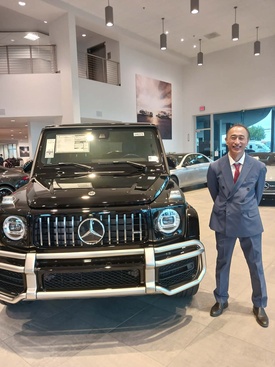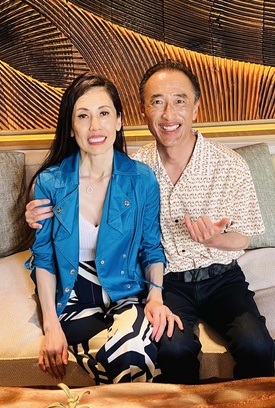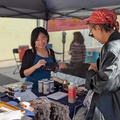A frog jumping out of a well
Many of the Japanese who come to America, the so-called Shin-Issei, end up working for Japanese companies, perhaps because of the language barrier. However, Toshi Sato, who works for Mercedes-Benz in Long Beach and is the "world's best Mercedes-Benz salesman," says that not only are the majority of his customers non-Japanese, but there are no other Japanese salespeople in the Mercedes-Benz industry.
"When I started selling Mercedes Benz here in 2005, I became number one within three months. But my English wasn't good, so I would take notes of what other salespeople were saying to customers and create my own scripts."
Toshi emphasizes that even if you are not fluent in English, there is a lot more that Japanese people can do in America if they have the spirit to take on challenges.
"I think Japanese people are missing out on a lot. You have a much better chance if you work for a local company and can use English rather than a Japanese company. I myself initially joined a Japanese company as a local hire. However, even though we were doing the same job, as a local hire, my salary was only one-third of that of a Japanese expatriate, and there was a set upper limit."
Toshi's first experience in America was spending a period in California during high school. After that, he worked for the operating company of Disneyland in Japan before going to Hawaii to study the language, but was unable to find work there and returned to work in a hotel in Japan. However, unable to give up his desire to live in Hawaii, he jumped at the chance to work on an amusement facility that was scheduled to open, and returned to Hawaii, only for the construction plans to fall through. In the end, Toshi's first job in America was as a customer service manager at a Japanese travel agency in Hawaii, where he was hired locally.
Using Japanese-style service as a weapon
However, he recalls that the working environment there was not a comfortable one, even if he was biased. "When I was in a Japanese company, I was like a frog in a well, and I didn't know anything about the outside world," says Toshi, who left Hawaii for the mainland United States in search of bigger opportunities.
"I wanted to work selling cars, especially selling Mercedes-Benz cars, which I had always wanted to own," he said, and after working as a Volvo salesman, he started working at Mercedes-Benz of Long Beach, where he still works, in 2005. He quickly rose to become a top salesman in an English-speaking environment, and he says the secret to his success was "serving customers wholeheartedly, like a Japanese person would."
"We value our identity as Japanese, and we always bow to American customers, even though that is common in Japan. This is common in Japan, but not in America. I think that's why they are so pleased."
He has sold Mercedes-Benz cars to several thousand customers, and says that when they buy a new car, they request Toshi-san and even introduce them to their friends because Americans accept "Japanese-style service." However, America is a country of immigrants, and the customers who buy Mercedes-Benz cars are also immigrants from all over the world who have come here in pursuit of the American Dream.
"My customers come from a wide variety of countries, including India, Korea and Cambodia. Many of them started their challenges from scratch in this country, and have worked hard with the hope that one day, if they succeed, they will be able to buy a Mercedes Benz as proof of their success. When I sell a Mercedes Benz to such people, I feel very proud, and it also reminds me that America is a meritocracy."
Today's Japanese people are "not greedy"
Speaking of meritocracy, Tosi's job is a full commission system where income is based on the amount of sales. The harder he sells, the more he earns. As a result, Tosi has proven his skills as "the salesman who sells the most Mercedes Benzes in the world." As mentioned above, he said it's a waste that Japanese people don't try to work for American companies even after coming to America. But how do Japanese people in Japan look?
"Japanese people today seem disappointing. I feel like a lot of people think that working hard is uncool. They don't see the value in working hard to buy a Mercedes. In other words, they have lost all desire. In fact, the other day the president of a famous Japanese company came to our showroom, but without knowing it was him, I ended up rambling on for an hour about how Japanese companies should try to enter the American market more seriously. The Japanese population is small but the Spanish population is by far the largest, and Filipino household incomes are high. If you're doing business in America, you can't just deal with Japanese people" (laughs).
Although Toshi laments the lack of self-interest in Japanese people, he is an American citizen who obtained an American passport in order to support his Japanese spouse. "But at heart, I will always be Japanese."
Finally, we asked him about his vision for the future. "While selling Mercedes Benz, I want to expand my work as a sales and customer service coach. If I could do it (to become a top salesman), you can do it too." With or without Toshi's help, we can only hope that more Japanese people will boldly take on the challenge of the American market.
© 2024 Keiko Fukuda







